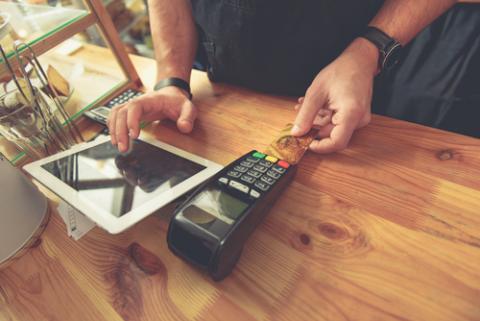Doing business will soon become easier for Ukrainian entrepreneurs: retailers will be subject to simpler regulations and there will be fewer grounds for penalties. The Better Regulation Delivery Office (BRDO) is working to promote the de-regulation of this sector as part of the FORBIZ project.
Mykhaylo, 42, is the IT Manager of a small retail company that is expanding its chain of home furnishing stores throughout Ukraine. A couple of dozen sales outlets have payment transaction recorders – a.k.a. cash registers. These print out fiscal documents – or receipts.
According to Mykhaylo, who is responsible for this equipment, a good cash register costs around $700–800. Pretty steep for a small enterprise like this. In addition, the company is required to pay for regular maintenance services, forking out about UAH 300 (around €10) every month for each cash register.
Mykhaylo believes that the procedures to register and operate cash registers in Ukraine are convoluted and disregard the advances in information technologies, the same technologies that are being actively implemented by Ukrainian businessmen and public authorities.
Essentially, retail business in Ukraine is governed by regulations dating as far back as the early 1990s, while the framework law was adopted in 1996. In addition, since the country gained independence, the state has steadily increased its control of clearing and settlement transactions in an effort to bring cash out of the shadows.
“There is a huge layer of regulatory problems with the registration and operation of cash registers that has been building up for over two decades,” says Myroslav Laba, an expert at the Better Regulation Delivery Office (BRDO), on the country’s outdated laws and regulations. The BRDO, which is supported by the European Union as part of the FORBIZ project and the EU4Business initiative, has been tackling the problems encountered by small- and medium-sized businesses for over two years, particularly the de-regulation of retail trade and the operation of cash registers.
The BRDO is working to resolve issues that are pressing for hundreds of thousands of Ukrainian entrepreneurs. According to the Ministry of Finance of Ukraine, there were 308,000 registered cash registers in the country at the beginning of this year. The law requires that they be used for all transactions in the retail, catering and service sectors, including currency exchange.
However, BRDO experts believe that cash registers could be used by many more entrepreneurs if the hurdles were removed. These include the overpricing of equipment, expensive maintenance and over-regulation.
Simple and handy
In 2019, Mykhaylo and his company, as well as other retailers and service providers that sell or use cash registers, expect the over-regulated device registration process to become much simpler. This should happen once the State Fiscal Service (the tax authority in Ukraine) implements the decisions passed by the government in 2018.
One of the expected improvements is a simpler registration process. Specifically, entrepreneurs who want to use a cash register will no longer have to go back and forth between the State Fiscal Service and the Service Centre to submit or obtain hard copies of permits and approvals. Once the government-approved innovations are implemented, it will be possible to register cash registers online in as little as an hour.
These changes in trade regulations have been possible in no small part thanks to the initiatives of the Better Regulation Delivery Office, which prompted the Cabinet of Ministers of Ukraine and the Ministry of Finance to amend their regulatory documents.
Smartphone instead of checkout
The most revolutionary innovation, however, could be the introduction of dedicated software that will turn smartphones, tablets and laptop computers into cash registers. Entrepreneurs will be able to abandon their expensive cash registers and save a bundle by replacing paper sales receipts with digital ones. This will help small- and medium-sized businesses to cut costs considerably and streamline the customer service process.
“It took civil organisations and our experts almost a year of lobbying to push through the trial project using innovative technologies to register cash transactions,” says Myroslav Laba (BRDO). According to Myroslav, joint efforts with the Ministry of Finance and the Ministry of Economic Development helped convince the government to kick off the trial project.
The Ministry of Finance of Ukraine is already accepting bids from software companies keen to take part in the project. Their software will be tested as possible alternatives to conventional cash registers.
BRDO experts believe this will reduce the size of the shadow market. “If the purchase and maintenance of fiscal devices stops being a luxury and becomes a convenient tool for small- and medium-sized businesses, more entrepreneurs will be interested in using them,” says Myroslav Laba. This will help bring to light whole segments of consumer markets such as taxi operators, e-commerce, passenger and freight carriers, fitness centres, healthcare and dental surgeries, travel agencies, and other such businesses.
The activities of the BRDO (Better Regulation Delivery Office) are supported by the European Union as part of the FORBIZ project and the EU4Business initiative. The BRDO’s mission is to streamline business processes and promote efficient governance in the key economic sectors. The FORBIZ project aims to provide support to a programme of reforms in Ukraine and improve the country’s economy through a systematic shift to a more favourable business climate. Small- and medium-sized enterprises (SMEs) are the focus of the project. The main objective is to facilitate a change in economic policy agenda in order to raise the significance of SMEs and recognise the important role they play in the country’s economic recovery. At the same time, the project aims to reduce the regulatory burden and mitigate the risks for businesses.
Author: Katerina Shapoval
The article was prepared for the EU4Business initiative.

